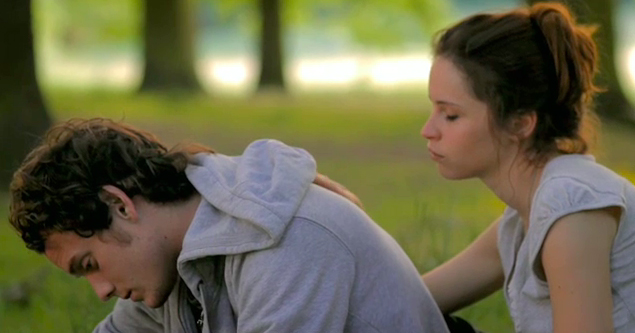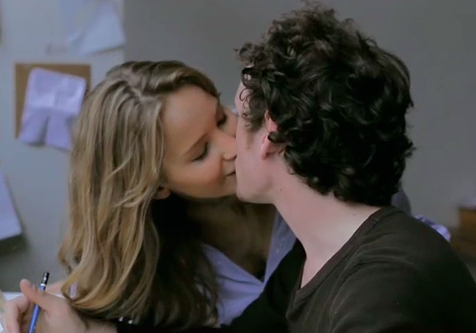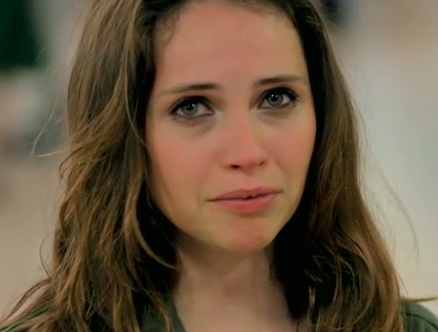Editor's Note: As a special treat for our London Film Festival coverage, I asked our correspondents Craig and David to share conversations about the movies that they happen to see together. Today, LIKE CRAZY and the Oscar buzz baffles them...
 Anton Yelchin and Felicity Jones are lovers in and out of it in "Like Crazy"
Anton Yelchin and Felicity Jones are lovers in and out of it in "Like Crazy"
David: I think the first thing we should probably note about Like Crazy is how, well, un-crazy it is. 'Like Cute' would be a more fitting, if rather more nauseating, title. Perhaps I've just grown too cynical, but I don't think that's it. A piece of furniture tells us they love each other 'like crazy', but they don't. One of the few scenes I'd pick out was just after Anna (Felicity Jones) has introduced Jacob (Anton Yelchin) to her parents - they start kissing like mad, and for those few seconds I felt the heat between them, the flush of a youthful romance. But there wasn't nearly enough of that to establish the connection we're supposed to feel throughout the whole film.
Craig: I think the cuteness of the pairing was the thing director Drake Doremus seemed to want to eagerly translate the most, what with all the chair inscriptions and diary notes. (Clearly that chair wanted to be Like Crazy’s “Rosebud”.) Haven’t we seen this kind of meet-cute cinematic dalliance before, in things like Garden State, Elizabethtown etc? I was over quirk-filled romanticised moping the moment it began. Here it comes with a slightly dourer and artfully managed sense of itself – like a mini-me Blue Valentine... The Formative Years, yet without that film’s tender baggage.
Humor, Jennifer Lawrence, Oscar buzz, after the jump...
David: It strikes me that Like Crazy gets away with the pretence of a bit more dramatic heft than the likes of Garden State purely because no one's overloaded its soundtrack with melancholy indie songs. Although I'm not a particular fan of any of these films, this one loses even more points because it doesn't even want to try and amuse us at the same time. Comparisons to Blue Valentine are, quite frankly, insulting.
 Jennifer Lawrence co-stars. Love her or leave her!The treatment of the other lovers they encounter in their lives is bizarrely sexist, too; Jennifer Lawrence gets a bit of sympathy for being oddly besotted with Anton Yelchin, but Charlie Bewley is basically laughed off the screen for showing any love towards Felicity Jones. That's all despite their being a lot more vibrancy in those two relationships than we witness between the central pairing.
Jennifer Lawrence co-stars. Love her or leave her!The treatment of the other lovers they encounter in their lives is bizarrely sexist, too; Jennifer Lawrence gets a bit of sympathy for being oddly besotted with Anton Yelchin, but Charlie Bewley is basically laughed off the screen for showing any love towards Felicity Jones. That's all despite their being a lot more vibrancy in those two relationships than we witness between the central pairing.
Oh and can we please dismiss, before all these witnesses, any Oscar talk for Felicity Jones? It's a sweet performance. She's lovely. But there's nothing to it.
Craig: I certainly agree with you on Lawrence and Bewley. Both their characters received short shrift – as is films such as this one’s wont – and were essentially plot catalysts. Both might have made a better pair of leading lovers.
And I wasn’t in any way comparing Like Crazy and Valentine on any qualitative level! Merely pointing out the general correlations in both films’ narrative trajectories and how much of a weak imprint Crazy feels after Valentine’s raw emotional grind.
David: Oh, absolutely. If anything, the comparison makes me look at Like Crazy with a more disdainful eye than it probably deserves. Ultimately, Yelchin and Jones' supposed turmoil never feels like much more than the foolish mistakes of a first love, one destined to be a fond memory in their later lives. The film seemed to construct their romance through eye-catching techniques rather than letting us witness much actual chemistry between them. Keeping the camera away from their scribbled messages to each other is a cute little device to suggest they're a real couple who deserve their privacy. But, in that case, shouldn't the cameraman hot-tail it out of their apartments?
 Private moments in flash cuts.
Private moments in flash cuts.
What does a speed-cut montage of them lying asleep in various entangled configurations tell me that makes them distinguishable from the couple who live next door to me?
Craig: A series of flashy jump-cuts is easy to do and looks about right for this kind of make-it-quick-make-it-cool hip outing. Anna and Jacob find each other in class and then spend every minute past the opening titles falling in and out of love and good moods – all in a bafflingly oblique manner and with little pause for anything remotely resonant to enter the fray. The film’s narrative hinge was caused by such a pointlessly banal act of selfishness that I found it hard to care much about either him or her.
David: When it happened, that hinge you mention struck me as forgivably naive, a foolish mistake by someone in the flush of love, but the rest of the film's melodrama leans so heavily on it that all sympathy evaporates. There's none of the wild devotion and passion you'd really expect from the title and the advertising even in the initial stages of their relationship. The fatal contradiction is that we're supposed to believe in both their intrinsic connection and that the only thing keeping their lives entangled is the impossibility of their union. And that dilemma is compounded in the ending.
 Craig: When all we’re shown are fitful visual bites of their time together it's hard to care. Scant amounts of Go-Karting, walking on beaches and drinking champagne from the bottle does not a deep connection make. I’m not joking when I say that I thought Big made the damaging effects of unobtainable romance feel more heart-wrenchingly painful with less fuss and more moments of humour twenty-three years ago. (One thing Like Crazy really needed was a laugh or two.) More than anything, all that prettified moping and internalised suffering just made me extra glad I saw What’s Your Number? in the same week.
Craig: When all we’re shown are fitful visual bites of their time together it's hard to care. Scant amounts of Go-Karting, walking on beaches and drinking champagne from the bottle does not a deep connection make. I’m not joking when I say that I thought Big made the damaging effects of unobtainable romance feel more heart-wrenchingly painful with less fuss and more moments of humour twenty-three years ago. (One thing Like Crazy really needed was a laugh or two.) More than anything, all that prettified moping and internalised suffering just made me extra glad I saw What’s Your Number? in the same week.
David: Like Crazy could definitely do with some humour. Any it had it seems, again, to be the private domain of the characters. Shouldn't we be laughing with them? I think their burgeoning careers are used as a storytelling device to make us feel more sympathetic. But both characters slip so easily into success into their chosen fields that I almost resented them for it. Announcements of their success and progression are shorthand for the audience to cheer for them but we've seen no struggle, no effort, no actual evidence of their work. (Except that chair, of course.) Their happiness in these scenes seems at odds with their relationship woes. Why isn't the passion consuming your narrative? Why doesn't your promotion seem bittersweet, since it simultaneously confirms your romantic separation? It's as if their crazy passion was all varnished into the chair, and every so often, they remembered to sit on it and cry.
Craig: D / David: C